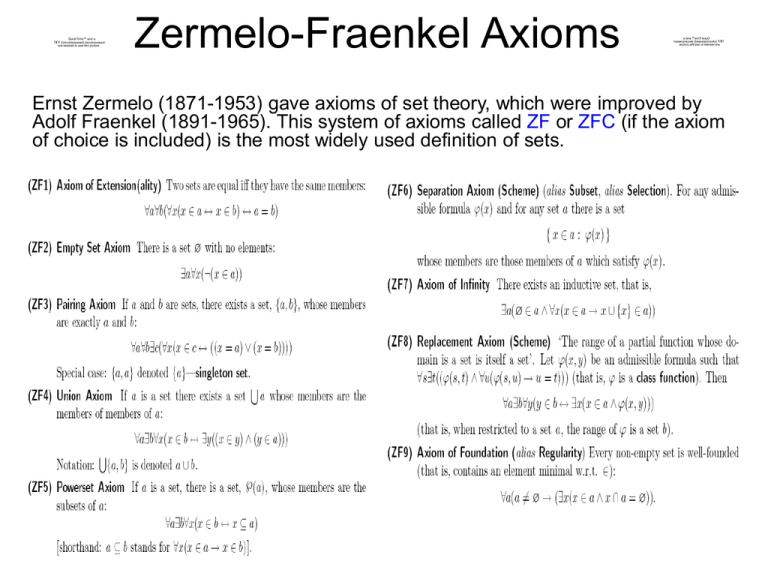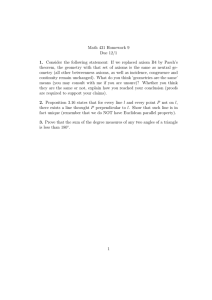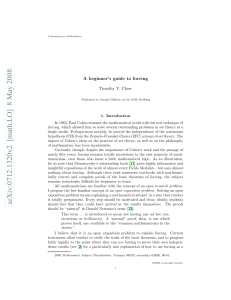Zermelo-Fraenkel Axioms
advertisement

QuickTime™ and a TIFF (Uncompressed) decompressor are needed to see this picture. Zermelo-Fraenkel Axioms a dna ™emiTkciuQ rosserpmoced )desserpmocnU( F FIT .erutcip siht ees ot dedeen era Ernst Zermelo (1871-1953) gave axioms of set theory, which were improved by Adolf Fraenkel (1891-1965). This system of axioms called ZF or ZFC (if the axiom of choice is included) is the most widely used definition of sets. The Axiom of choice • Equivalent formulations of the Axiom of choice: – Given any set of mutually exclusive non-empty sets, there exists at least one set that contains exactly one element in common with each of the non-empty sets. – Any product of nonempty sets is nonempty – Let X be a collection of non-empty sets. Then we can choose a member from each set in that collection • There are other axioms which equivalent to the axiom of choice: – Well-ordering principle: Every set can be wellordered – Zorn's lemma: Every partially ordered set in which every chain (i.e. totally ordered subset) has an upper bound contains at least one maximal element Zorn’s lemma is e.g. used to show that every vector space has a basis. If one accepts the axiom of choice then the Banach-Tarski “paradox” holds Consistency and completeness • A system of axioms is called complete, if all the true statements can be proven from the axiom. • A system of axioms is called consistent if it is not possible to derive a contradiction from them. • A set of axioms is relatively consistent with respect to a second set of axioms, if the first set is consistent if the second one is. • A statement is called independent of a system of axioms, if it cannot be proved or disproved using the axioms. • K. Gödel showed that – In any consistent axiomatic system (formal system of mathematics) sufficiently strong to allow one to do basic arithmetic, one can construct a statement about natural numbers that can be neither proved nor disproved within that system. Rephrased: a sufficiantly strong system is not complete. – Any sufficiently strong consistent system cannot prove its own consistency. – Therefore set theory is neither complete, nor can it be proven to be consistent within the realm of set theory. – (1935) ZFC is relatively consistent with ZF • F. Cohen (1963) showed the axiom of choice is independent of ZF. The Continuum hypothesis • Cantor expected that all infinite subsets of R have either the cardinality 0 of the cardinality c of the continuum. • Assuming the axiom of choice; rephrased there are no cardinals 0 between c= 2 and .1 • The continuum hypothesis can be phrased as 2 0 1 • The generalized continuum hypothesis reads 2 1 • Gödel (1939) proved that the (generalized) continuum hypothesis is consistent with ZFC. • P. Cohen proved – The continuum hypothesis is independent of ZFC. – The negation of the continuum hypothesis is consistent with ZFC Kurt Gödel and Paul J. Cohen QuickTime™ and a TIFF (Uncompressed) decompressor are needed to see this picture. QuickTime™ and a TIFF (Uncompressed) decompressor are needed to see this picture. QuickTime™ and a TIFF (Uncompressed) decompressor are needed to see this picture. Born in1906 in Brno 1929 PhD at the Unversity of Vienna 1930 faculty at the University of Vienna 1931 Incompleteness Theorems. 1932 Habilitation 1940 emigration to the US bcoming citizen in 1948. Member of the IAS in Princeton (permanent from 1953 on) 1940 relative consistency of the continuumhypothesis. Died in 1978 Born in 1934 1958 PhD University of Chicago Was at MIT and the IAS and became faculty at Stanford in 1961 1966 Fields Medal Invented “forcing”. This can be used to show the independence of the axiom of choice and the generalized continuum hypothesis. QuickTime™ and a TIFF (Uncompressed) decompressor are needed to see this picture. QuickTime™ and a TIFF (Uncompressed) decompressor are needed to see this picture.


